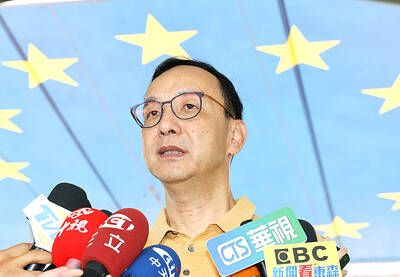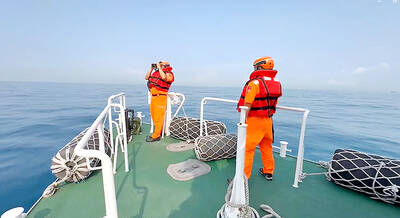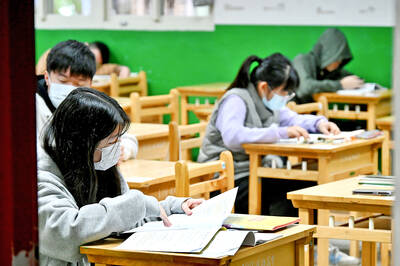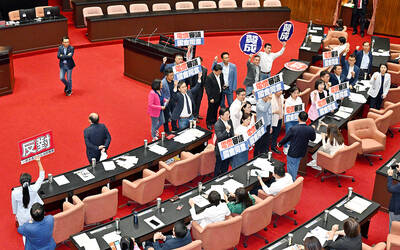The Democratic Progressive Party’s (DPP) electoral strategy committee on Saturday recommended that the party recruit Hsinchu Mayor Lin Chih-chien (林智堅) to run for mayor of Taoyuan in the local elections on Nov. 26.
The committee — presided over by President Tsai Ing-wen (蔡英文), who is chair of the party and head of the committee — also recommended that DPP Legislator Tsai Shih-ying (蔡適應), who represents a district in Keelung, run for mayor of Keelung and that Hsinchu Deputy Mayor Shen Hui-hung (沈慧虹) run for mayor of Hsinchu.
The committee has forwarded its recommendations to the party’s Central Standing Committee ahead of a meeting on Wednesday.

Photo: Taipei Times
The three cities have DPP mayors: Keelung Mayor Lin Yu- chang (林右昌), Taoyuan Mayor Cheng Wen-tsan (鄭文燦) and Hsinchu Mayor Lin Chih-chien.
Lin Chih-chien is considered a younger-generation DPP politician. In 2009, he won a city councilor seat in Hsinchu, before becoming the youngest Hsinchu mayor at the age of 39 in 2014. He won re-election in 2018, becoming the first DPP mayor to win a second term in Hsinchu.
Lin Chih-chien said in an interview with the Chinese-language Liberty Times (sister paper of the Taipei Times) that Hsinchu and Taoyuan have close cultural and historical connections.
“The two regions [Hsinchu and Taoyuan] are one combined ‘working and living space,’” he said. “Over the years, people in Taoyuan have gone to festivals and temple events in Hsinchu, and to visit relatives, while people in Hsinchu have gone to Taoyuan to visit relatives and for recreation.”
The DPP has yet to name its nominees in the key Taipei and New Taipei City elections for mayor.
However, Minister of Health and Welfare Chen Shih-chung (陳時中) and former minister of transportation and communications Lin Chia-lung (林佳龍) are the top names on the party’s list of candidates for Taipei mayor, while DPP Legislator Lo Chih-cheng (羅致政) is the party’s top candidate for New Taipei City mayor, party members said.

GOOD DIPLOMACY: The KMT has maintained close contact with representative offices in Taiwan and had extended an invitation to Russia as well, the KMT said The Chinese Nationalist Party (KMT) would “appropriately handle” the fallout from an invitation it had extended to Russia’s representative to Taipei to attend its international banquet last month, KMT Chairman Eric Chu (朱立倫) said yesterday. US and EU representatives in Taiwan boycotted the event, and only later agreed to attend after the KMT rescinded its invitation to the Russian representative. The KMT has maintained long-term close contact with all representative offices and embassies in Taiwan, and had extended the invitation as a practice of good diplomacy, Chu said. “Some EU countries have expressed their opinions of Russia, and the KMT respects that,” he

An increase in Taiwanese boats using China-made automatic identification systems (AIS) could confuse coast guards patrolling waters off Taiwan’s southwest coast and become a loophole in the national security system, sources familiar with the matter said yesterday. Taiwan ADIZ, a Facebook page created by enthusiasts who monitor Chinese military activities in airspace and waters off Taiwan’s southwest coast, on Saturday identified what seemed to be a Chinese cargo container ship near Penghu County. The Coast Guard Administration went to the location after receiving the tip and found that it was a Taiwanese yacht, which had a Chinese AIS installed. Similar instances had also

CHANGES: After-school tutoring periods, extracurricular activities during vacations or after-school study periods must not be used to teach new material, the ministry said The Ministry of Education yesterday announced new rules that would ban giving tests to most elementary and junior-high school students during morning study and afternoon rest periods. The amendments to regulations governing public education at elementary schools and junior high schools are to be implemented on Aug. 1. The revised rules stipulate that schools are forbidden to use after-school tutoring periods, extracurricular activities during summer or winter vacation or after-school study periods to teach new course material. In addition, schools would be prohibited from giving tests or exams to students in grades one to eight during morning study and afternoon break periods, the

AMENDMENT: Contact with certain individuals in China, Hong Kong and Macau must be reported, and failure to comply could result in a prison sentence, the proposal stated The Chinese Nationalist Party (KMT) and the Taiwan People’s Party (TPP) yesterday voted against a proposed bill by Democratic Progressive Party (DPP) lawmakers that would require elected officials to seek approval before visiting China. DPP Legislator Puma Shen’s (沈伯洋) proposed amendments to the Act Governing Relations Between the People of the Taiwan Area and the Mainland Area (臺灣地區與大陸地區人民關係條例), stipulate that contact with certain individuals in China, Hong Kong and Macau should be reported, while failure to comply would be punishable by prison sentences of up to three years, alongside a fine of NT$10 million (US$309,041). Fifty-six voted with the TPP in opposition